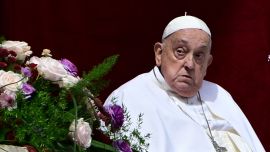With Diana Mondino’s midweek exit from the Foreign Ministry (as much abrupt as it was a chronicle of a death foretold) President Javier Milei has ditched half his original Cabinet in little over 10 months, not only displacing the helm but also eliminating the portfolio as a whole in half the four ministerial changes so far (even if Guillermo Francos was promoted from Interior minister to Cabinet chief). The fiscal and macro-economic stability so obsessively sought and obtained in the inflation data (with country risk only a third of this time last year) finds its antithesis in this extreme administrative volatility, when political fragmentation could be permitting calmer waters.
But within this general context this week’s news is Mondino. At the 1997 funeral of Princess Diana, Charles Spencer said about his sister: “Of all the ironies about Diana, perhaps the greatest was this – a girl given the name of the ancient goddess of hunting was, in the end, the most hunted person of the modern age.” Something along those lines could now be said about Mondino over a quarter of a century later. Flurries of rumours as to her imminent dismissal were a constant dogging her throughout her 10 months in office before finally materialising this week.
The rivalry between Vice-President Victoria Villarruel and the kitchen Cabinet of the “iron triangle” (in which Milei is joined by his sister, presidential chief-of-staff Karina Milei, and star spin doctor Santiago Caputo, with the tail wagging the dog as often as not) is said to constitute the bitterest infighting within the libertarian camp and yet both were strangely united in their hostility to Mondino. Both found her too soft for different reasons – the nationalist wing represented by Villarruel chose to interpret her fluent English and cosy relationship with the new British Foreign Secretary David Lammy as a Malvinas sell-out, while the “iron triangle” resented the lucid economist placing commercial priorities over ideological purity in the relationship with such important G20 trade partners as Spain, Brazil or China. Not of their kidney, while the President (who directly ordered Mondino out, according to government sources) enjoys strutting on the world stage far too much not to need more empathy with this minister than most portfolios.
The more recent sniping tended to come over the Malvinas issue – calling the disputed islands “Malvinas/Falklands” in an agreement to visit war graves brokered by the International Red Cross (where a defensive Mondino overacted her repudiation of the use of the F-word) and the insistence that those interested in both the RIGI major investment incentive scheme and investing in the archipelago should report exclusively to a Buenos Aires which could do absolutely nothing for them on the latter front. The final nail in Mondino’s coffin was Wednesday’s United Nations vote in favour of ending the embargo against Cuba (especially sensitive for her successor in the Ministry, the current Argentine Ambassador to Washington Gerardo Werthein), precisely because the votes of the overwhelming majority of 187 of the 193 UN member states could be needed to back Argentina’s Malvinas sovereignty claims. Nor did it help that Argentina’s UN ambassador Ricardo Lagorio was a holdover from the Frente de Todos administration but was that the fault of Mondino or the government as a whole?
Mondino was not the first Foreign Ministry official to go (the latest in a long line was deputy minister Leopoldo Sahores a fortnight ago) and nor will she be the last with Milei ordering a purge of the diplomatic corps and Karina and Santiago Caputo imposing their own people. Perhaps her cardinal sin in presidential eyes was showing too much respect for professional diplomats, a fraternity to whom the economist out of her comfort zone felt alien. Not that Werthein offers much background there – of the 16 foreign ministers since the return of democracy in 1983, only three (Susana Ruiz Cerutti, Jorge Taiana and Jorge Faurie) have been diplomats. Now the profession is more estranged than ever from government with the pressures to toe the line bound to increase.
But what line might that be? Libertarian lecture tours are no substitute for a foreign policy, of which there is little sign apart from a firm alignment with a United States about to choose a new leader in three days and Israel – entirely inadequate for such a complex planet. The name of the minister is less important than a well-defined foreign policy which also has its importance for drawing the attention of the outside world in general and investors in particular alongside macro-economic or fiscal stability and legal security.


















Comments